Older adults can save tens of thousands of dollars annually by choosing assisted living communities over aging in place in their homes.
Unlike point solutions, Inspiren unifies resident safety, care planning, staffing, and emergency response into a single AI-powered platform.
An artificial intelligence-powered virtual assistant platform for senior living and care providers.

 In 2019, Tech adoption changes -- some. It’s known as the
In 2019, Tech adoption changes -- some. It’s known as the
Comments
From Patrick J. Fischer via LinkedIn
Smartphones are great solutions for older adults and everyone of them need to have a phone, and text messaging ability. Rather than load their Smartphone up with apps it makes more sense to use EZGUI and keep it simple.
From Jason Bennett via LinkedIn
The adoption trends have been inching upwards for this demographic now looks like getting more traction. Great. Experience designers for this demographic are key, I see a shift in the timing of that expense for startups in this space as it’s a make or break.
From Paul Gibson via LinkedIn
Could be another example of the technology adoption lifecycle in action...? Originally applied to innovations in farming, the 'late majority' and 'laggard' communities were typically more conservative (and older).
From John, via email
First of all, I owe you a thank you for putting a big smile (one of the few smiles), on my mother in law's face when she was in an ALF in her 85th year. She was totally bedridden with arthritis. All she could do was watch TV, for the most part. And her hands were incapable of using a regular remote. So she had to pull her attendant cord every time she wanted to turn it on or off, or change channels. You wrote about the Flipper, a remote with only six buttons. I got her that, programmed it for the few channels she watched. She smiled broadly because that became one thing that she could control.
Her progression into helplessness is also relevant to your comments about the low incidence of computer use among the oldest demos. She was very active in the use of computers in her 70's. She spent a good amount of her time communicating with a group of friends. But then, her capabilities made it impossible. Voice Activation might have solved the problem to some extent, and she had very computer literate grandchildren, but this was the early 2000's and it was not that well developed at that time. I bring up this point because you and others comment about the low incidence of computer ownership by that demo group. One of the groups that do these surveys should ask a question about whether they previously owned a computer.
From Raymond Wright, via Twitter
I have to agree, but them I am biased (Wellbeing Monitor ). I often visit the local Apple stores during the daytime. There purchasing their new iPhones, iPads and Apple Watch’s and attending the training and educational classes is the Baby Boomer generation.